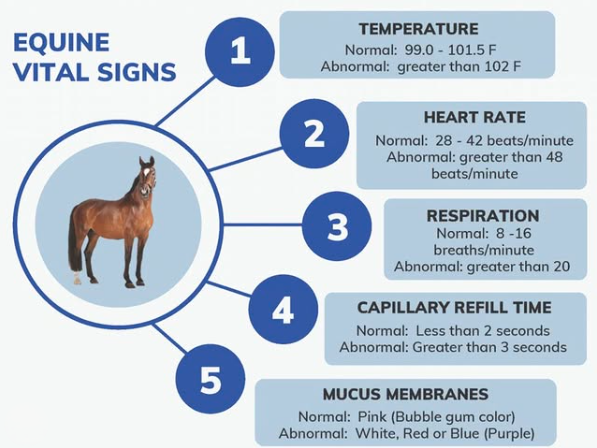Recognizing an Emergency
Knowing what constitutes an emergency can save valuable time. Here’s a guide to recognizing situations that require immediate veterinary attention:
Dystocia: Difficulties in foaling, especially labor lasting more than 15–20 minutes or the appearance of anything other than two front feet and a muzzle.
Colic: Symptoms may include restlessness, pawing, circling, repeated lying down and getting up, looking at the abdomen, kicking at the abdomen, depression, lethargy, and loss of appetite.
Respiratory Distress: Severe breathing difficulties, with horses appearing anxious and unwilling to eat or drink.
Wounds: Any puncture, wound, or laceration that penetrates through the skin or is actively bleeding.
Non-Weight Bearing Lameness: Any reluctance or resistance to move or any uncoordinated, wobbly gait.
Choke: Signs include food, saliva, or foam coming from the nose or mouth, especially after eating, along with an outstretched neck and straining to swallow.
Diarrhea: Abnormal consistency of manure persisting for more than 24 hours.
General Illness: Signs of sickness such as depression, lethargy, decreased appetite, or fever.
Down Horse: A horse that is unable to rise or is struggling to do so.
Eye Emergencies: Any discoloration/cloudiness, wounds, excessive tearing, squinting, discharge, swelling, or light sensitivity.
What to Do in an Emergency
- Stay Calm: Your horse can sense your anxiety, so remaining calm will help keep them calm as well.
- Ensure Safety: Move your horse to a safe, enclosed area if possible, and keep yourself safe while handling them.
- Call Us Immediately: Contact Colorado Equine Clinic at (303) 791-4747 Our team is available 24/7 to assist you.
- Send Photos: If possible, take clear photos of the injury or issue and send them to our main number. This helps us better assess the situation and prepare for your arrival.
- Provide Details: Be ready to describe your horse’s symptoms, behavior, and any relevant history to help us prepare for your arrival or guide you through immediate steps.
- Follow Instructions: Our team will provide guidance on how to stabilize your horse until help arrives or until you can bring them to our clinic.
Our Emergency Services
Colorado Equine Clinic is equipped to handle a wide range of equine emergencies, including:
- Emergency wound management and repair
- Trauma care for injuries and fractures
- Emergency lameness evaluations
- Neonatal and foal emergencies
- Critical care and hospitalization
For colic cases, we provide comprehensive supportive care, including:
- Overnight monitoring
- IV fluids and electrolyte therapy
- Pain management and medication
- Diagnostic evaluations to assess the severity of the condition
While we do not perform colic surgeries at our facility, we will work closely with you to determine the best course of action and, if necessary, refer you to a surgical facility for advanced care.
After-Hours Emergencies
Emergencies don’t always happen during business hours, and neither do we. Our team is available 24 hours a day, 7 days a week to provide emergency care for your horse.
Emergency Contact Number: (303) 791-4747
What to Expect When You Arrive
When you bring your horse to Colorado Equine Clinic for an emergency, our team will:
Perform a thorough evaluation to assess your horse’s condition.
Discuss treatment options and provide a clear plan of action.
Keep you informed every step of the way, ensuring you understand the care your horse is receiving.
Preparing for Emergencies
While we hope you never face an equine emergency, it’s always best to be prepared. Here are a few tips:
- Keep our contact number saved in your phone: (303) 791-4747
- Have a well-stocked equine first aid kit on hand.
- Know your horse’s normal vital signs and behavior to quickly identify abnormalities.
- Ensure your trailer is in good working condition in case you need to transport your horse.
Contact Us
If you have any questions about our emergency services or need immediate assistance, please don’t hesitate to call or text us. Please text any photos you can of the emergency.
Colorado Equine Clinic
9616 West Titan Road. Littleton CO, 80125
Office Phone: (303) 791-4747
Email: wellness@coequine.com

